【英语】情态动词讲解及练习(含答案)
英语情态动词含答案解析
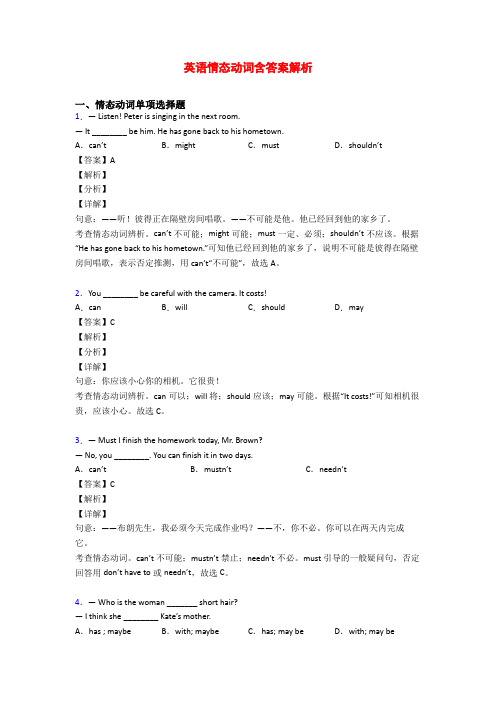
英语情态动词含答案解析一、情态动词单项选择题1.— Listen! Peter is singing in the next room.— It ________ be him. He has gone back to his hometown.A.can’t B.might C.must D.shouldn’t【答案】A【解析】【分析】【详解】句意:——听!彼得正在隔壁房间唱歌。
——不可能是他。
他已经回到他的家乡了。
考查情态动词辨析。
can’t不可能;might可能;must一定、必须;shouldn’t不应该。
根据“He has gone back to his hometown.”可知他已经回到他的家乡了,说明不可能是彼得在隔壁房间唱歌,表示否定推测,用can’t“不可能”,故选A。
2.You ________ be careful with the camera. It costs!A.can B.will C.should D.may【答案】C【解析】【分析】【详解】句意:你应该小心你的相机。
它很贵!考查情态动词辨析。
can可以;will将;should应该;may可能。
根据“It costs!”可知相机很贵,应该小心。
故选C。
3.— Must I finish the homework today, Mr. Brown?— No, you ________. You can finish it in two days.A.can’t B.mustn’t C.needn’t【答案】C【解析】【详解】句意:——布朗先生,我必须今天完成作业吗?——不,你不必。
你可以在两天内完成它。
考查情态动词。
can’t不可能;mustn’t禁止;needn’t不必。
must引导的一般疑问句,否定回答用don’t have to或needn’t,故选C。
4.— Who is the woman _______ short hair?—I think she ________ Kate’s mother.A.has ; maybe B.with; maybe C.has; may be D.with; may be【答案】D【解析】【分析】【详解】句意:——那个短发的女人是谁?——我想她可能是凯特的妈妈。
【英语】情态动词练习题含答案及解析
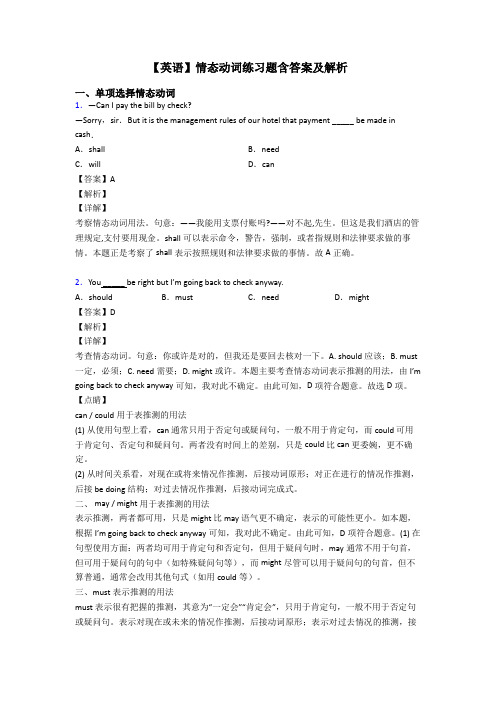
【英语】情态动词练习题含答案及解析一、单项选择情态动词1.—Can I pay the bill by check?—Sorry,sir.But it is the management rules of our hotel that payment _____ be made in cash.A.shall B.needC.will D.can【答案】A【解析】【详解】考察情态动词用法。
句意:——我能用支票付账吗?——对不起,先生。
但这是我们酒店的管理规定,支付要用现金。
shall可以表示命令,警告,强制,或者指规则和法律要求做的事情。
本题正是考察了shall表示按照规则和法律要求做的事情。
故A正确。
2.You _____ be right but I’m going back to check anyway.A.should B.must C.need D.might【答案】D【解析】【详解】考查情态动词。
句意:你或许是对的,但我还是要回去核对一下。
A. should应该;B. must 一定,必须;C. need需要;D. might或许。
本题主要考查情态动词表示推测的用法,由I’m going back to check anyway可知,我对此不确定。
由此可知,D项符合题意。
故选D项。
【点睛】can / could用于表推测的用法(1) 从使用句型上看,can 通常只用于否定句或疑问句,一般不用于肯定句,而could 可用于肯定句、否定句和疑问句。
两者没有时间上的差别,只是could 比 can 更委婉,更不确定。
(2) 从时间关系看,对现在或将来情况作推测,后接动词原形;对正在进行的情况作推测,后接 be doing 结构;对过去情况作推测,后接动词完成式。
二、 may / might用于表推测的用法表示推测,两者都可用,只是 might 比 may 语气更不确定,表示的可能性更小。
英语情态动词含答案解析
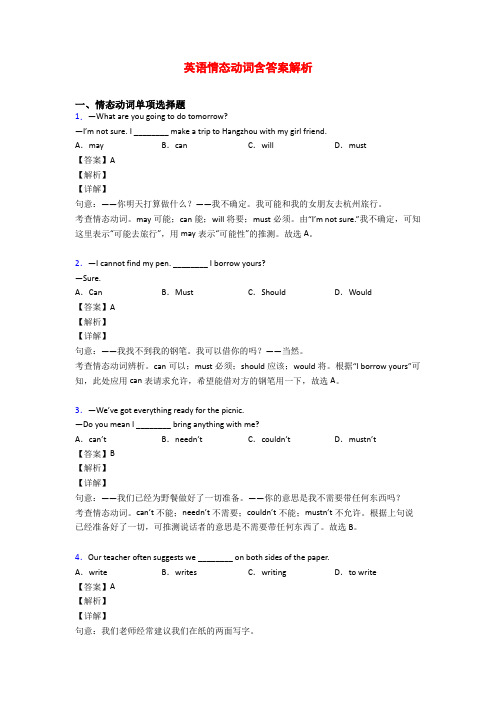
英语情态动词含答案解析一、情态动词单项选择题1.—What are you going to do tomorrow?—I’m not sure. I ________ make a trip to Hangzhou with my girl friend.A.may B.can C.will D.must【答案】A【解析】【详解】句意:——你明天打算做什么?——我不确定。
我可能和我的女朋友去杭州旅行。
考查情态动词。
may可能;can能;will将要;must必须。
由“I’m not sure.”我不确定,可知这里表示“可能去旅行”,用may表示“可能性”的推测。
故选A。
2.—I cannot find my pen. ________ I borrow yours?—Sure.A.Can B.Must C.Should D.Would【答案】A【解析】【详解】句意:——我找不到我的钢笔。
我可以借你的吗?——当然。
考查情态动词辨析。
can可以;must必须;should应该;would将。
根据“I borrow yours”可知,此处应用can表请求允许,希望能借对方的钢笔用一下,故选A。
3.—We’ve got everything ready for the picnic.—Do you mean I ________ bring anything with me?A.can’t B.needn’t C.couldn’t D.mustn’t【答案】B【解析】【详解】句意:——我们已经为野餐做好了一切准备。
——你的意思是我不需要带任何东西吗?考查情态动词。
can’t不能;needn’t不需要;couldn’t不能;mustn’t不允许。
根据上句说已经准备好了一切,可推测说话者的意思是不需要带任何东西了。
故选B。
4.Our teacher often suggests we ________ on both sides of the paper.A.write B.writes C.writing D.to write【答案】A【解析】【详解】句意:我们老师经常建议我们在纸的两面写字。
(完整版)情态动词用法及其练习与答案
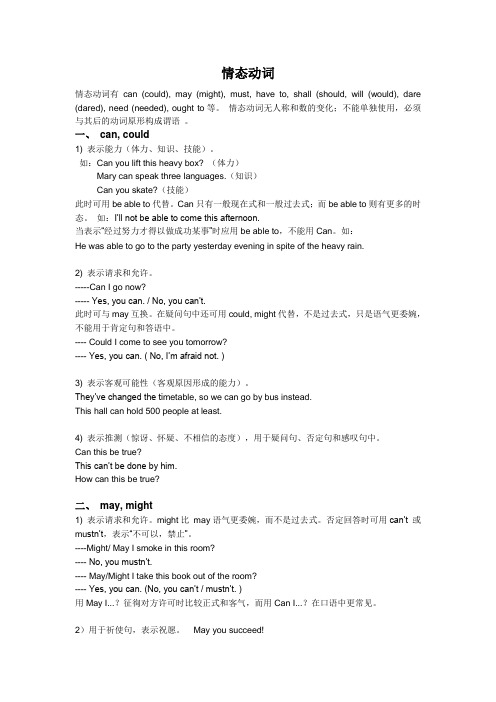
情态动词情态动词有can (could), may (might), must, have to, shall (should, will (would), dare (dared), need (needed), ought to等。
情态动词无人称和数的变化;不能单独使用,必须与其后的动词原形构成谓语。
一、can, could1) 表示能力(体力、知识、技能)。
如:Can you lift this heavy box? (体力)Mary can speak three languages.(知识)Can you skate?(技能)此时可用be able to代替。
Can只有一般现在式和一般过去式;而be able to则有更多的时态。
如:I’ll not be able to come this afternoon.当表示“经过努力才得以做成功某事”时应用be able to,不能用Can。
如:He was able to go to the party yesterday evening in spite of the heavy rain.2) 表示请求和允许。
-----Can I go now?----- Yes, you can. / No, you can’t.此时可与may互换。
在疑问句中还可用could, might代替,不是过去式,只是语气更委婉,不能用于肯定句和答语中。
---- Could I come to see you tomorrow?---- Yes, you can. ( No, I’m afraid not. )3) 表示客观可能性(客观原因形成的能力)。
They’ve changed the ti metable, so we can go by bus instead.This hall can hold 500 people at least.4) 表示推测(惊讶、怀疑、不相信的态度),用于疑问句、否定句和感叹句中。
英语情态动词含答案解析
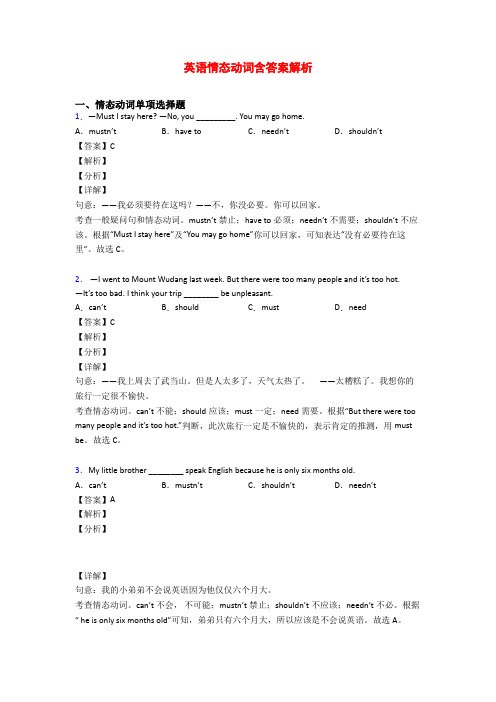
英语情态动词含答案解析一、情态动词单项选择题1.—Must I stay here? —No, you _________. You may go home.A.mustn’t B.have to C.needn’t D.shouldn’t【答案】C【解析】【分析】【详解】句意:——我必须要待在这吗?——不,你没必要。
你可以回家。
考查一般疑问句和情态动词。
mustn’t禁止;have to必须;needn’t不需要;shouldn’t不应该。
根据“Must I stay here”及“You may go home”你可以回家,可知表达“没有必要待在这里”。
故选C。
2.—I went to Mount Wudang last week. But there were too many people and it’s too hot.—It’s too bad. I think your trip ________ be unpleasant.A.can’t B.should C.must D.need【答案】C【解析】【分析】【详解】句意:——我上周去了武当山。
但是人太多了,天气太热了。
——太糟糕了。
我想你的旅行一定很不愉快。
考查情态动词。
can’t不能;should应该;must一定;need需要。
根据“But there were too many people and it’s too hot.”判断,此次旅行一定是不愉快的,表示肯定的推测,用must be。
故选C。
3.My little brother ________ speak English because he is only six months old.A.can’t B.m ustn’t C.shouldn’t D.needn’t【答案】A【解析】【分析】【详解】句意:我的小弟弟不会说英语因为他仅仅六个月大。
考查情态动词。
【英语】 情态动词练习题(含答案)
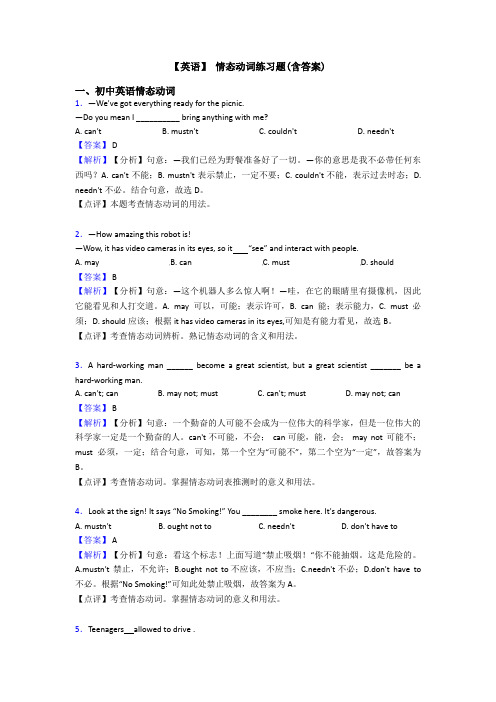
【英语】情态动词练习题(含答案)一、初中英语情态动词1.—We've got everything ready for the picnic.—Do you mean I __________ bring anything with me?A. can'tB. mustn'tC. couldn'tD. needn't【答案】 D【解析】【分析】句意:—我们已经为野餐准备好了一切。
—你的意思是我不必带任何东西吗?A. can't 不能;B. mustn't 表示禁止,一定不要;C. couldn't不能,表示过去时态;D. needn't不必。
结合句意,故选D。
【点评】本题考查情态动词的用法。
2.—How amazing this robot is!—Wow, it has video cameras in its eyes, so it “see” and interact with people.A. mayB. canC. mustD. should【答案】 B【解析】【分析】句意:—这个机器人多么惊人啊!—哇,在它的眼睛里有摄像机,因此它能看见和人打交道。
A. may 可以,可能;表示许可,B. can 能;表示能力,C. must 必须;D. should应该;根据it has video cameras in its eyes,可知是有能力看见,故选B。
【点评】考查情态动词辨析。
熟记情态动词的含义和用法。
3.A hard-working man ______ become a great scientist, but a great scientist _______ be a hard-working man.A. can't; canB. may not; mustC. can't; mustD. may not; can【答案】 B【解析】【分析】句意:一个勤奋的人可能不会成为一位伟大的科学家,但是一位伟大的科学家一定是一个勤奋的人。
【英语】高考英语情态动词答题技巧及练习题(含答案)
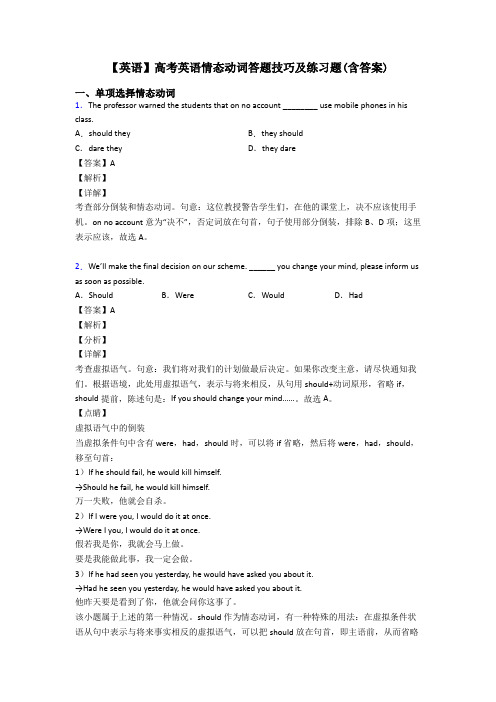
【英语】高考英语情态动词答题技巧及练习题(含答案)一、单项选择情态动词1.The professor warned the students that on no account ________ use mobile phones in his class.A.should they B.they shouldC.dare they D.they dare【答案】A【解析】【详解】考查部分倒装和情态动词。
句意:这位教授警告学生们,在他的课堂上,决不应该使用手机。
on no account意为“决不”,否定词放在句首,句子使用部分倒装,排除B、D项;这里表示应该,故选A。
2.We’ll make the final decision on our scheme. ______ you change your mind, please inform us as soon as possible.A.Should B.Were C.Would D.Had【答案】A【解析】【分析】【详解】考查虚拟语气。
句意:我们将对我们的计划做最后决定。
如果你改变主意,请尽快通知我们。
根据语境,此处用虚拟语气,表示与将来相反,从句用should+动词原形,省略if,should提前,陈述句是:If you should change your mind……。
故选A。
【点睛】虚拟语气中的倒装当虚拟条件句中含有 were,had,should时,可以将if省略,然后将 were,had,should,移至句首:1)If he should fail, he would kill himself.→Should he fail, he would kill himself.万一失败,他就会自杀。
2)If I were you, I would do it at once.→Were I you, I would do it at once.假若我是你,我就会马上做。
英语情态动词含答案解析
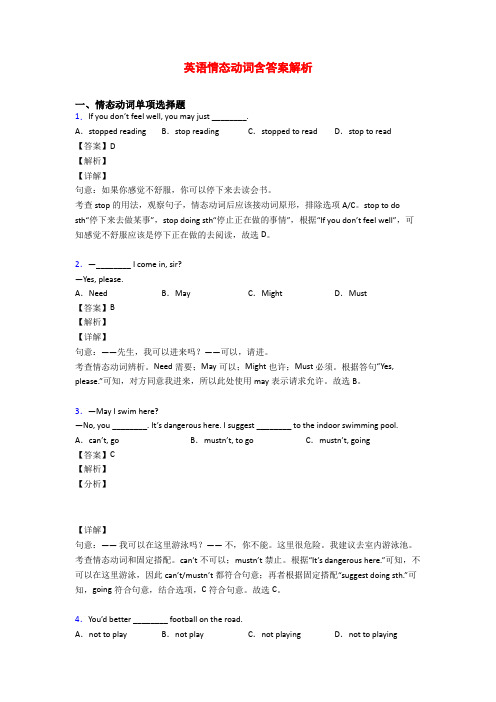
英语情态动词含答案解析一、情态动词单项选择题1.If you don’t feel well, you may just ________.A.stopped reading B.stop reading C.stopped to read D.stop to read【答案】D【解析】【详解】句意:如果你感觉不舒服,你可以停下来去读会书。
考查stop的用法,观察句子,情态动词后应该接动词原形,排除选项A/C。
stop to dosth“停下来去做某事”,stop doing sth“停止正在做的事情”,根据“If you don’t feel well”,可知感觉不舒服应该是停下正在做的去阅读,故选D。
2.—________ I come in, sir?—Yes, please.A.Need B.May C.Might D.Must【答案】B【解析】【详解】句意:——先生,我可以进来吗?——可以,请进。
考查情态动词辨析。
Need需要;May可以;Might也许;Must必须。
根据答句“Yes, please.”可知,对方同意我进来,所以此处使用may表示请求允许。
故选B。
3.—May I swim here?—No, you ________. It’s dangerous here. I suggest ________ to the indoor swimming pool. A.can’t, go B.mustn’t, to go C.mustn’t, going【答案】C【解析】【分析】【详解】句意:——我可以在这里游泳吗?——不,你不能。
这里很危险。
我建议去室内游泳池。
考查情态动词和固定搭配。
can’t不可以;mustn’t禁止。
根据“It’s dangerous here.”可知,不可以在这里游泳,因此can’t/mustn’t都符合句意;再者根据固定搭配“suggest doing sth.”可知,going符合句意,结合选项,C符合句意。
英语情态动词含答案解析
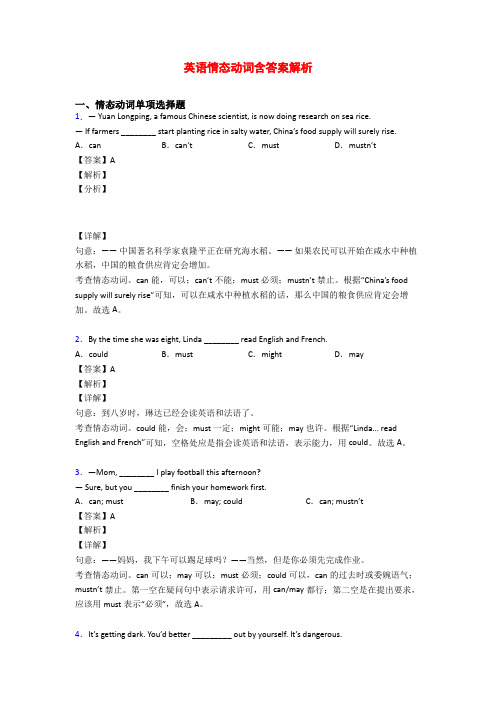
英语情态动词含答案解析一、情态动词单项选择题1.— Yuan Longping, a famous Chinese scientist, is now doing research on sea rice.—If farmers ________ start planting rice in salty water, China’s food supply will surely rise. A.can B.can’t C.must D.mustn’t【答案】A【解析】【分析】【详解】句意:——中国著名科学家袁隆平正在研究海水稻。
——如果农民可以开始在咸水中种植水稻,中国的粮食供应肯定会增加。
考查情态动词。
can能,可以;can’t不能;must必须;mustn’t禁止。
根据“China’s food supply will surely rise”可知,可以在咸水中种植水稻的话,那么中国的粮食供应肯定会增加。
故选A。
2.By the time she was eight, Linda ________ read English and French.A.could B.must C.might D.may【答案】A【解析】【详解】句意:到八岁时,琳达已经会读英语和法语了。
考查情态动词。
could能,会;must一定;might可能;may也许。
根据“Linda... read English and French”可知,空格处应是指会读英语和法语,表示能力,用could。
故选A。
3.—Mom, ________ I play football this afternoon?— Sure, but you ________ finish your homework first.A.can; must B.may; could C.can; mustn’t【答案】A【解析】【详解】句意:——妈妈,我下午可以踢足球吗?——当然,但是你必须先完成作业。
初中英语情态动词详细用法归纳(含练习及答案)
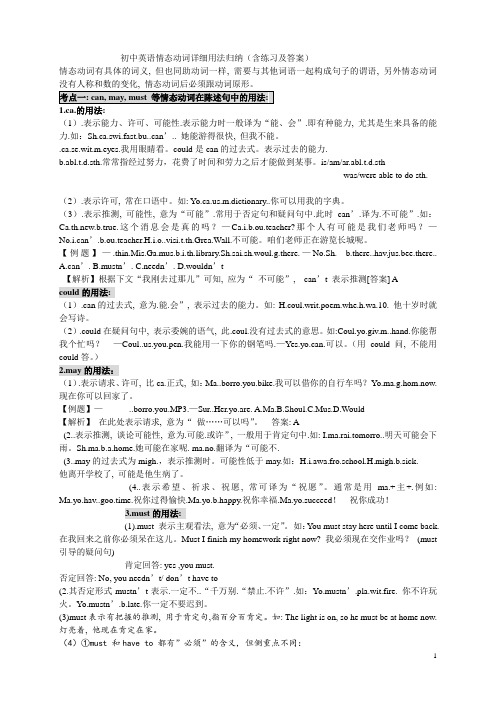
初中英语情态动词详细用法归纳(含练习及答案)情态动词有具体的词义, 但也同助动词一样, 需要与其他词语一起构成句子的谓语, 另外情态动词没有人称和数的变化, 情态动词后必须跟动词原形。
1.ca.的用法:(1).表示能力、许可、可能性.表示能力时一般译为“能、会”.即有种能力, 尤其是生来具备的能力.如:Sh.ca.swi.fast.bu..can’.. 她能游得很快, 但我不能。
.ca.se.wit.m.eyes.我用眼睛看。
could是can的过去式。
表示过去的能力.b.abl.t.d.sth.常常指经过努力,花费了时间和劳力之后才能做到某事。
is/am/ar.abl.t.d.sthwas/were able to do sth.(2).表示许可, 常在口语中。
如: .m.dictionary..你可以用我的字典。
(3).表示推测, 可能性, 意为“可能”.常用于否定句和疑问句中.此时can’.译为.不可能”.如:Ca.th.new.b.true.这个消息会是真的吗?—Ca.i.b.ou.teacher?那个人有可能是我们老师吗?—No.i.can’.b.ou.teacher.H.i.o..visi.t.th.Grea.Wall.不可能。
咱们老师正在游览长城呢。
【例题】—.thin.Mis.Ga.mus.b.i.th.library.Sh.sai.sh.woul.g.there.—No.Sh.__b.there..hav.jus.bee.there..A.can’.B.mustn’.C.needn’.D.wouldn’t【解析】根据下文“我刚去过那儿”可知, 应为“不可能”, can’t 表示推测[答案] Acould的用法:(1).can的过去式, 意为.能.会”, 表示过去的能力。
如: H.coul.writ.poem.whe.h.wa.10. 他十岁时就会写诗。
(2).could在疑问句中, 表示委婉的语气, 此.coul.没有过去式的意思。
高考英语情态动词讲解及习题(附答案)
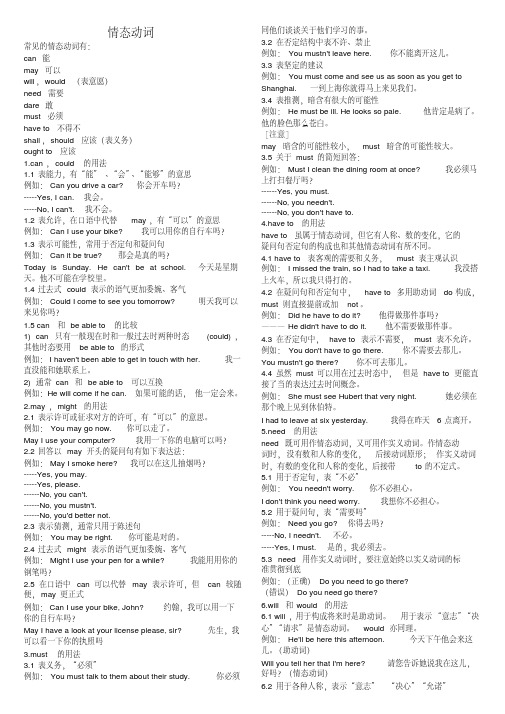
情态动词常见的情态动词有:can 能may 可以will,would (表意愿)need 需要dare 敢must 必须have to 不得不shall,should 应该(表义务)ought to 应该1.can,could 的用法1.1表能力,有“能”、“会”、“能够”的意思例如:Can you drive a car? 你会开车吗?-----Yes, I can. 我会。
-----No, I can't. 我不会。
1.2表允许,在口语中代替may,有“可以”的意思例如:Can I use your bike?我可以用你的自行车吗?1.3表示可能性,常用于否定句和疑问句例如:Can it be true?那会是真的吗?Today is Sunday. He can't be at school.今天是星期天。
他不可能在学校里。
1.4过去式could表示的语气更加委婉、客气例如:Could I come to see you tomorrow?明天我可以来见你吗?1.5 can 和be able to 的比较1) can 只有一般现在时和一般过去时两种时态(could),其他时态要用be able to的形式例如:I haven't been able to get in touch with her.我一直没能和她联系上。
2) 通常can 和be able to 可以互换例如:He will come if he can.如果可能的话,他一定会来。
2.may,might的用法2.1表示许可或征求对方的许可,有“可以”的意思。
例如:You may go now.你可以走了。
May I use your computer?我用一下你的电脑可以吗?2.2回答以may开头的疑问句有如下表达法:例如:May I smoke here? 我可以在这儿抽烟吗?-----Yes, you may.-----Yes, please.------No, you can't.------No, you mustn't.------No, you'd better not.2.3表示猜测,通常只用于陈述句例如:You may be right.你可能是对的。
【英语】英语情态动词题20套(带答案)及解析
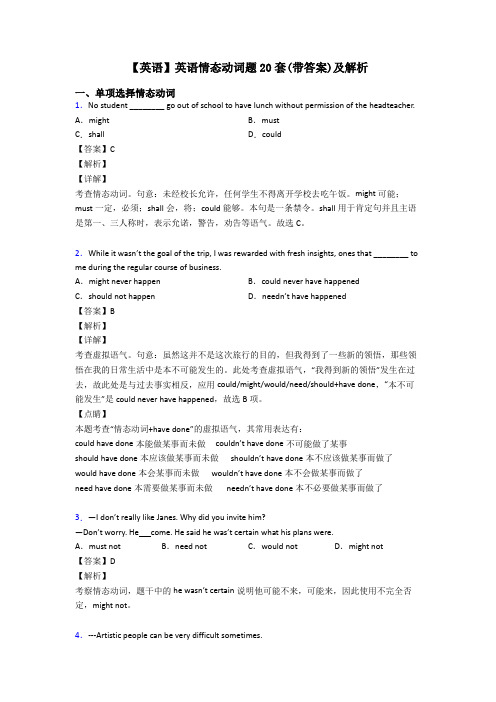
【英语】英语情态动词题20套(带答案)及解析一、单项选择情态动词1.No student ________ go out of school to have lunch without permission of the headteacher. A.might B.mustC.shall D.could【答案】C【解析】【详解】考查情态动词。
句意:未经校长允许,任何学生不得离开学校去吃午饭。
might可能;must一定,必须;shall会,将;could能够。
本句是一条禁令。
shall用于肯定句并且主语是第一、三人称时,表示允诺,警告,劝告等语气。
故选C。
2.While it wasn’t the goal of the trip, I was rewarded with fresh insights, ones that ________ to me during the regular course of business.A.might never happen B.could never have happenedC.should not happen D.needn’t h ave happened【答案】B【解析】【详解】考查虚拟语气。
句意:虽然这并不是这次旅行的目的,但我得到了一些新的领悟,那些领悟在我的日常生活中是本不可能发生的。
此处考查虚拟语气,“我得到新的领悟”发生在过去,故此处是与过去事实相反,应用could/might/would/need/should+have done,“本不可能发生”是could never have happened,故选B项。
【点睛】本题考查“情态动词+have done”的虚拟语气,其常用表达有:could have done本能做某事而未做couldn’t have done不可能做了某事should have done本应该做某事而未做shouldn’t have done本不应该做某事而做了would have done本会某事而未做wouldn’t have done本不会做某事而做了need have done本需要做某事而未做needn’t have done本不必要做某事而做了3.—I don’t really like Janes. Why did you invite him?—Don’t worry. He come. He said he was’t certain what his plans were.A.must not B.need not C.would not D.might not【答案】D【解析】考察情态动词,题干中的he wasn’t certain说明他可能不来,可能来,因此使用不完全否定,might not。
【英语】高中英语情态动词技巧和方法完整版及练习题含解析

【英语】高中英语情态动词技巧和方法完整版及练习题含解析一、单项选择情态动词1.It wasn’t right to me that such near neighbors not know one another.A.could B.wouldC.should D.might【答案】C【解析】【详解】考查情态动词。
句意:对我来说,很不正常,如此近的邻居居然不认识。
A. could可能,能够;B. would将;C. should竟然;D. might可能,也许。
should 作为情态动词,可以用来表示意外、惊喜或者在说话人看来是不可思议的,常常译为"竟会"、"居然",住的这么近的邻居居然不认识。
表示意外,所以答案选C。
【点睛】should的用法1、should 作为情态动词,通常用来表示现在或将来的责任或义务,译作“应该”、“应当”,这时它可以和 ought to, be supposed to 互换使用.例如:You should (= ought to ) tell your mother about it at once.2、should 作为情态动词,可以用在条件状语从句中,表示语气较强的假设,译作“万一”、“竟然”,这时也可将 should 置于从句之首,即将 should 放在主语前面,而省略从属连词 if。
例如:If you should fail to come, ask Mrs Chen to work in your place. (= Should you fail to come, ask Mrs Chen to work in your place. )3、should 作为情态动词,可以表示谦逊、客气、委婉之意,译为“可……”、“倒……”。
例如:I should say that it would be better to try it again.4、should 作为情态动词,可以用来表示意外、惊喜或者在说话人看来是不可思议的.尤其在以 why, who, how 等开头的修辞疑问句或某些感叹句中常常译为“竟会”、“居然”。
(英语)英语情态动词专项习题及答案解析含解析

A.mustn'tB.can't
C.won'tD.needn't
【答案】B
【解析】
D[考查虚拟语气。句意:不可能是邮递员在门口,才六点钟呢。mustn't禁止,不允许;can't不可能;won't不愿意,就是不,偏不;needn't不需要。]
A.mustn’tB.needn’t
C.wouldn’tD.shouldn’t
【答案】B
【解析】
【详解】
考查情态动词。句意:我喜欢周末,因为周六周日不必早起。A. mustn’t不能,禁止;B. needn’t不必;C. wouldn’t不会;D. shouldn’t不应该。此处表示“不必”,故B项正确。
【解析】
【详解】
考查情态动词特殊用法。句意:—你非要现在打扰我吗?我正在准备一份报告。—真对不起,但是我怕有紧急事情告诉你。A. Need需要;B. Should应该;C. Might也许;D. Must必须;一定;偏偏,非得;根据语境可知must表示“偏偏,非得”符合上下文语境,用来指责对方。故D项正确。
Oil will float on water.油总是浮在水面上。
She will listen to music alone in her room for hours.她独自在房间里听音乐,一听往往就是几小时。
【点睛】
should的用法
1、should作为情态动词,通常用来表示现在或将来的责任或义务,译作“应该”、“应当”,这时它可以和ought to, be supposed to互换使用.例如:You should(= ought to)tell your mother about it at once.
英语情态动词含答案解析

英语情态动词含答案解析一、情态动词单项选择题1.By the time she was eight, Daisy ________ read English and French.A.must B.need C.could D.may【答案】C【解析】【详解】句意:在Daisy八岁的时候,就可以读英语和法语了。
考查情态动词。
must必须;need需要;could能,会;may可以。
根据“By the time she was eight,”可知,是一般过去时态,从句和主句的时态保持一致,此处是会说英语和法语,用情态动词can的过去式could,故选C。
2.—Miss Chen, how can I get better grades in exams?—Besides by learning wisely and studying hard, you ________ be careful to check papers again. A.can’t B.might C.must【答案】C【解析】【详解】句意:——陈老师,我怎样才能在考试中取得更好的成绩呢?——除了明智地学习和努力学习之外,你必须仔细检查卷子。
考查情态动词。
can’t不能;might可能;must必须,一定。
根据“Miss Chen, how can I get better grades in exams?”及常识可知想要取得考成绩就一定要仔细检查试卷,用must符合语境。
故选C。
3.— Ann, ________ you finish the e-mail in twenty minutes?— Yes, I can.A.can B.must C.need D.should【答案】A【解析】【详解】句意:——安,你能在20分钟内写完邮件吗?——是的,我能。
考查情态动词。
can能够;must一定;need需要;should应该。
七年级英语:情态动词专项练习带答案解析
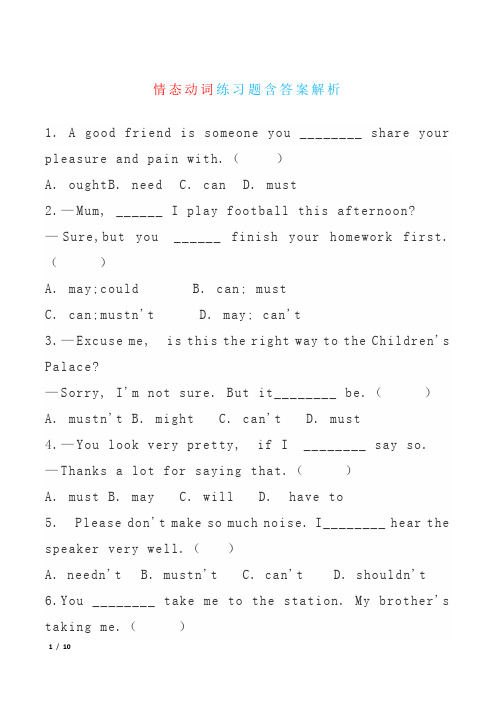
情态动词练习题含答案解析1. A good friend is someone you ________ share your pleasure and pain with.()A. oughtB. needC. canD. must2.—Mum, ______ I play football this afternoon?—Sure,but you ______ finish your homework first.()A. may;couldB. can; mustC. can;mustn'tD. may; can't3.—Excuse me, is this the right way to the Children's Palace?—Sorry, I'm not sure. But it________ be.()A. mustn'tB. mightC. can'tD. must4.—You look very pretty,if I ________ say so. —Thanks a lot for saying that.()A. mustB. mayC. willD. have to5. Please don't make so much noise. I________ hear the speaker very well.()A. needn'tB. mustn'tC. can'tD. shouldn't6.You ________ take me to the station. My brother's taking me.()A. can'tB. mustn'tC. shouldn'tD. don't have to7.—Mum, ________ I visit the Modern ArtMuseum next Monday?—I'm afraid you can't. All the museums in thiscity are closed on Monday.()A. wouldB. needC. shouldD. may8.We need clean air and water,so we ________ protect the environment.()A. canB. mayC. mustD. might9. —What should we do to protect the fish in the river?—We________ throw rubbish into the river.()A. needB. needn'tC. mustD. mustn't10.—What's wrong with Judy? She has been absent for two days.—Oh, she_____ be ill. Let's go to ask Mr. Green.()A. mayB. needC. would11.—We've got everything ready for the picnic.—Do you mean I______ bring anything with me?()A. can't B. mustn't C. couldn't D. needn't12.—Excuse me, ________ I take the magazine out of the reading room?—Sorry, you can't. Just here, please.()A. mustB. wouldC. mayD. need13.Rock music ___ sound popular with the young,but it's not the favor of the aged people.()A. mustB. needC. shouldD. may14.—Must I wait here all morning? I have a lot of work to do.—No, you____. You may be back in the afternoon.()A. mustn'tB. can'tC. don't have to15.The passengers ______ show their ID cards before getting on the plane.()A. mightB. mustC. could16. —Finally, they came back.—They_____ be hungry after such a long walk.()A. can'tB. mustC. needn't17. —I still haven't found my pet dog.—I'm sorry to hear that. You_____ be very sad.()A. canB. shouldC. mustD. will18. —Look at the young lady in red. Is it Mrs.Li?—No. It________ be her. She is wearing a white dress today.()A. mustn'tB. needn'tC. can't19. —Is that man Mr.Zhang?—It________ be him. He went to Beijing for a meeting yesterday.()A. can'tB. mustn'tC. needn't20. The girl in the classroom ________ be Sarah. She has gone to the library.()A. mayB. mustC. can'tD. needn't21. —Whose bike is this?—I am not sure. It ________ be Mary's.()A. shallB. mustC. might22. —Where are you going this month?—We________ go to Xiamen,but we're not sure.()A. needn'tB. mightC. mustD. mustn't23. —Is Tom coming by train?—He________ drive his car,I'm not sure.()A.can't B. may C. Must解析答案句意:一个好朋友就是和你一起分享你的快乐和悲伤的人。
初中英语情态动词讲解-练习及答案
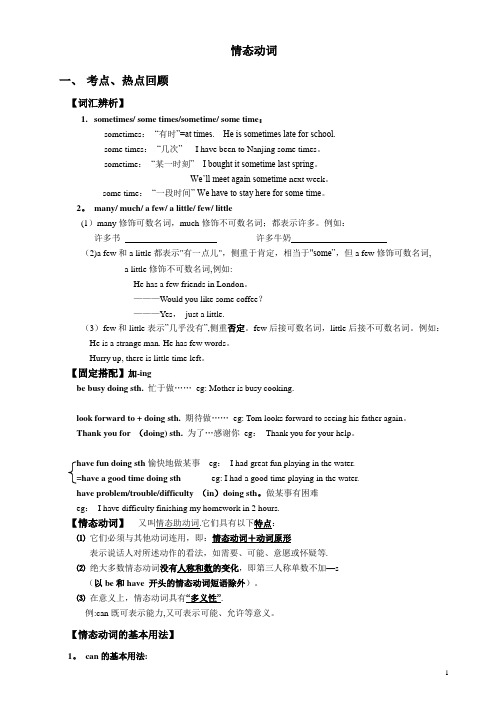
情态动词一、考点、热点回顾【词汇辨析】1.sometimes/ some times/sometime/ some time:sometimes:“有时”=at times. He is sometimes late for school.some times:“几次” I have been to Nanjing some times。
sometime:“某一时刻” I bought it sometime last spring。
We’ll meet again sometime next week。
some time:“一段时间” We have to stay here for some time。
2。
many/ much/ a few/ a little/ few/ little(1)many修饰可数名词,much修饰不可数名词;都表示许多。
例如:许多书许多牛奶(2)a few和a little都表示"有一点儿",侧重于肯定,相当于"some”,但a few修饰可数名词,a little修饰不可数名词,例如:He has a few friends in London。
———Would you like some coffee?———Yes,just a little.(3)few和little表示”几乎没有”,侧重否定。
few后接可数名词,little后接不可数名词。
例如:He is a strange man. He has few words。
Hurry up, there is little time left。
【固定搭配】加-ingbe busy doing sth.忙于做……eg: Mother is busy cooking.look forward to + doing sth. 期待做……eg: Tom looks forward to seeing his father again。
【英语】高中英语情态动词解题技巧及练习题含解析

【英语】高中英语情态动词解题技巧及练习题含解析一、单项选择情态动词1.would可以表达过去常常做的事,过去习惯发生的动作:Pirates would bury gold in a cave. 海盗们常常把黄金藏在山洞中。
We would take a walk along the river. 我们过去常常沿河散步。
3. would后接like、love、mind等动词,表示要求、邀请、希望或询问,此时不是说过去,而是对现在的询问:Would you like to come to my party? 你愿意来我的派对吗?Would you mind coming with us? 你介意和我们一起吗?比如本题,would 表示婉转的请求,征求对方的意见,故选A。
2.According to a newly released regulation on online video services, no one _____ generate, release or spread fake news or information by using such technologies.A.can B.shall C.will D.may【答案】B【解析】【详解】考查情态动词。
句意:根据最新发行的关于网络视频服务的规章,任何人都不可以使用此类技术生成、发行或者传播虚假消息。
A. can 能够,有时会;B. shall 一三人称表示征求对方意见;二三人称陈述句,表示允诺、威胁、恐吓或法律条文的规定。
C. will 意愿;D. may 也许,可能。
根据前面的regulation(规定)可知,本题选shall更加合理。
故选B。
3.—You rang me up at about 10:00 last night, didn't you?—No, I didn't phone you. It someone else.A.must have been B.could be C.must be D.could have been 【答案】A【解析】【详解】考查情态动词+have done。
- 1、下载文档前请自行甄别文档内容的完整性,平台不提供额外的编辑、内容补充、找答案等附加服务。
- 2、"仅部分预览"的文档,不可在线预览部分如存在完整性等问题,可反馈申请退款(可完整预览的文档不适用该条件!)。
- 3、如文档侵犯您的权益,请联系客服反馈,我们会尽快为您处理(人工客服工作时间:9:00-18:30)。
【英语】情态动词讲解及练习(含答案)一、单项选择情态动词1.Our English teacher is considerate,helpful,and warm-hearted,but sometimesshe________________ be angry at our silly mistakes.A.should B.mustC.can D.shall【答案】C【解析】【详解】考查情态动词。
句意:我们的英语老师很体贴、乐于助人、热心肠,但有时她可能为我们愚蠢的错误而发火。
can表示一种客观的可能性,但不一定会发生,故C项正确。
2.Mr. Baker, some students want to see you. ______ they wait here or outside?A.May B.Should C.Shall D.Will【答案】C【解析】【详解】考查Shall的用法。
句意:贝克先生,有些学生想见你。
他们是在这里等还是在外面等?Shall用于第一、第三人称疑问句中,表示说话人征求对方的意见或向对方请示。
故选C。
【点睛】Shall的用法Shall作为助动词,一般用于第一人称Ⅰ和We,表示一个将来的动作,构成将来时态。
Shall后面接动词原形。
例如:(1)I shall think it over and Let you know my idea.我将考虑一下此事,然后告诉你我的想法。
(2)We shall have a good time in the park.我们在公园里会玩得很高兴的。
常考的特殊用法1. Shall用于第一人称,表示征求对方的意愿。
如:What shall we do this evening?2. Shall用于第一、第三人称疑问句中,表示说话人征求对方的意见或向对方请示。
如:Shall we begin our lesson?When shall he be able to leave the hospital?3. Shall用于第二、第三人称,表示说话人给对方命令、警告、允诺或威胁。
如:You shall fail if you don't work harder. (警告)He shall have the book when I finish reading. (允诺)He shall be punished. (威胁)3.--- Oh, my God! I just missed the last bus back home.--- That’s really bad. I’m sure you ______ it, but you just didn’t hurry up.A.had caught B.could have caught C.could catch D.can catch【答案】B【解析】【详解】考查情态动词+have done结构。
句意:——哦,我的上帝!我刚好错过了回家的末班车。
——这是非常糟糕的。
我肯定你能赶上,但你就是不抓紧。
could have done“本来能做而没有做”。
故选B。
4.-- Did Jim come?-- I don’t know. He _______ while I was out.A.might have come B.might comeC.must have come D.should have come【答案】A【解析】【详解】考查情态动词推测用法。
句意:Jim来了吗?--我不知道,在我不在的时候,可能来过。
根据前文I don’t know.可知,说话者不知道Jim来没来,因此后文推测来过,但是语气很不确定,故可知选A。
对过去情况的推测为情态动词+have done,must have done 一定做了某事,should have done 应该来过,不符合,故选A。
【点睛】情态动词+have+过去分词的用法,表示推测或判断过去的情况。
can/could+have+过去分词用法:①多用于否定句和疑问句中。
表示对过去某事发生的可能性的否定或质疑,意为:不可能(已经)......了-(否定句)/可能(已经)......了嘛?-(疑问句)②用于肯定句中。
表示对过去没有做某事的遗憾,含有轻微的责备,意为:本来可以......的(但实际上没有......)。
You could have done better, but you were too careless.(肯定句。
他能做得更好的)should/ought to+have+过去分词用法:用于肯定句中。
表示对过去没有做某事的遗憾,含有责备的意思,意为:本来应该......的(但实际上没有......)。
用于否定句中-表示对过去已经做了某事的责备,意为:本来不应该......的(但实际上已经......了)。
He should have been asleep.(肯定句,他本应去睡觉的)He shouldn't have been asleep.(否定句,他本来不应该去睡觉的)。
may/might+have+过去分词用法:用于肯定句和否定句中,表示对过去发生某事的可能性的推测,意为:或许(已经)....../或许还没有......。
It is too late. He may have gone to bed. must+have+过去分词用法:表示对过去发生的事情十分肯定的推测。
must表示推测时,不能用在否定句和疑问句中。
I must have forgotten to tell you.(must 的引入,表达了说话者对过去忘记告诉你的这件事肯定推测)needn't+have+过去分词用法:表示对过去已经做了某事的后悔,意为:本来可以不必......的(可实际上却已经......)You needn't have taken a taxi here, for it was very near to my home.5.Paul did a great job in the speech contest. He many times last week.A.need have practised B.might practiseC.must have practised D.could practise【答案】C【解析】【详解】考查情态动词。
句意:保罗在演讲比赛中表现得很好。
他上星期一定练习了很多次。
must have done是对过去发生的动作最有把握的猜测,意思是“一定”。
故C选项正确。
6.---Hi, Johnson, any idea where Susan is?---It is class time, so she __________ in the classroom now.A.can be B.must have beenC.might have been D.should be【答案】D【解析】考查情态动词的用法。
A. can be可能,可以是;B. must have been一定(对过去事实肯定的推测);C. might have been可能(对过去事实肯定的推测);D. should be应该是。
句意:—知道苏珊在哪里吗?—现在是上课时间,她应该在教室里。
故答案选D。
7.—It’s really great to have a computer to store my photos.—Don’t count on it too much. It ________ break down and you’d better make a copy of them. A.must B.canC.should D.will【答案】B【解析】【详解】考查情态动词。
句意:——有一台计算机来储存照片真是太棒了。
——不要过度依赖它。
它有时候也会出故障,你最好做一个备份。
计算机出故障这是可能的事情,表示客观可能性用can。
must肯定,必须;should应该;will表意愿。
故B选项正确。
8.-- Turn off the TV, Jack. _______ your homework now?-- Mum, just ten more minutes, please.A.Will you be doing B.Should you be doingC.Shouldn't you be doing D.Couldn’t you be doing【答案】C【解析】【详解】考查含情态动词的进行时态。
句意:——把电视关掉,杰克。
你现在不应该做作业吗?——妈妈,请再给我十分钟。
此处表示目前应该在做某事,should“应该”,这里用含情态动词的进行时态,故选C。
9.Lack of sleep _______ lead to weakened immunity and memory, and also slow physical growth.A.shall B.must C.should D.can【答案】D【解析】【详解】考查情态动词辨析。
句意:睡眠不足会导致免疫力和记忆力下降,还会减缓身体发育。
A. shall将;B. must必须;C. should应该;D. can会,表示理论上或是逻辑判断上,用can,故选D。
10.—What happened to the young trees we planted last week?—The trees ________ well, but I didn’t water them.A.might grow B.needn’t have grownC.would have grown D.would grow【答案】C【解析】考查虚拟语气。
——我们上周种的小树怎么了?——这些小树本来会长得很好,但是我们没有给它们浇水。
根据语境可知,此处是对过去的事实进行假设,故本题选C。
11.—What’s wrong with you?—Oh, I am sick. I ________ so much ice cream just now.A.shouldn’t eat B.mustn’t eatC.couldn’t ha ve eaten D.shouldn’t have eaten【答案】D【解析】【详解】考查情态动词和虚拟语气。
句意:——你怎么了?——我生病了,我刚才不应该吃那么多冰激凌。
A. shouldn’t eat不应该吃;B. mustn’t eat禁止吃;C. couldn’t have eaten不可能吃;D. shouldn’t have eaten本来不应该吃。
